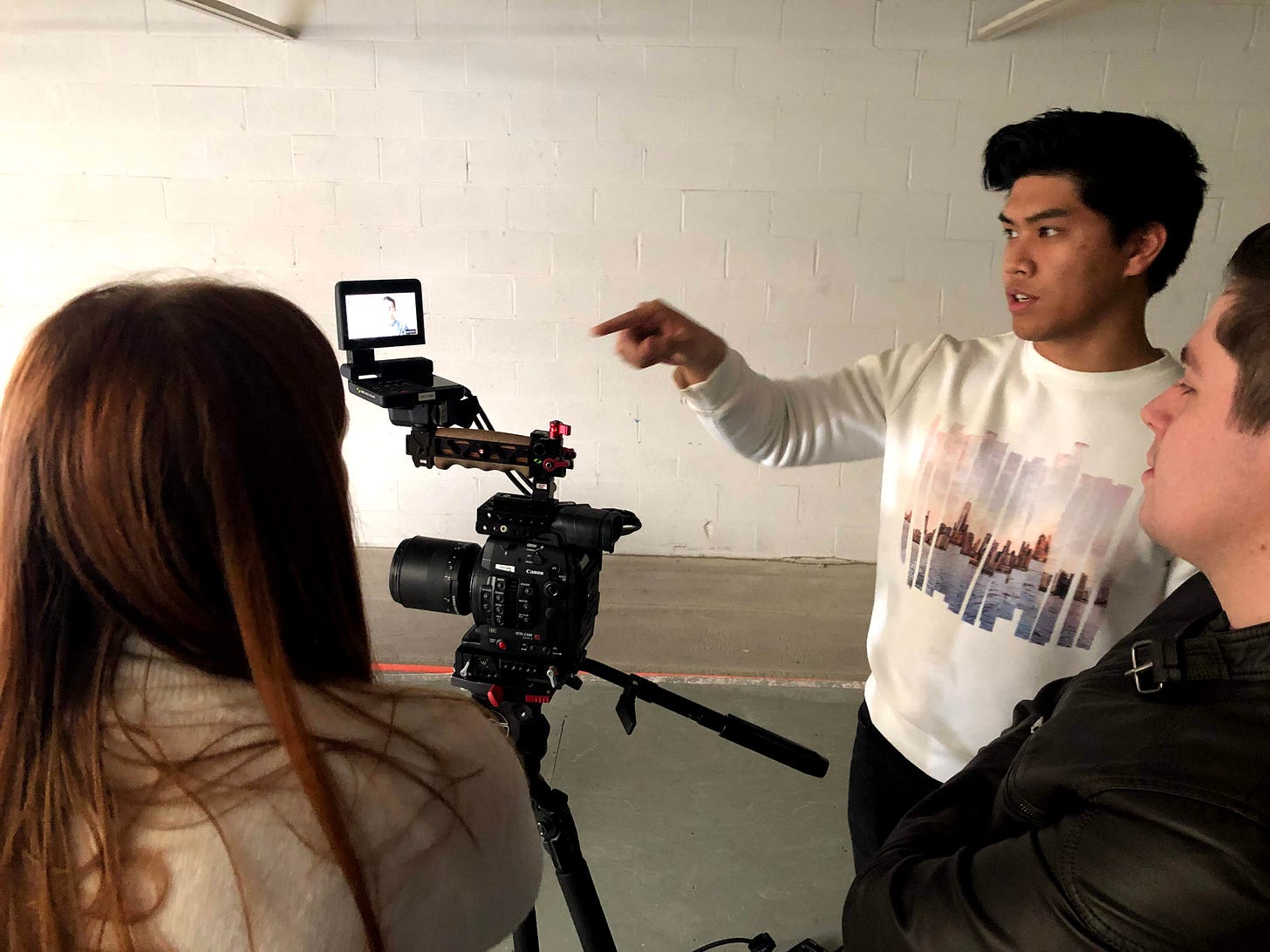Why Are We Falling Apart at Work?
Because We’re Busy Being the Humans
Volume 1, Issue 13
Gen Z and millennial professionals don’t like talking on the phone. Or so I hear. Maybe that’s too sweeping of a generalization. If you disagree, post your comments below. I’m happy to adjust my claim to match your data.
But before you post, you might want to consider the experience of this week’s Mode/Switch guest, Joe Barrera. His experience helps explain why early-career professionals feel anxious, not just about talking on the phone, but about all kinds of human exchange at work.
You might remember that the last Mode/Switch Mailbag featured a question from a reader named Abby, asking if there’d be a newsletter focused on workplace confidence. The first time I read her query, I blinked a couple of times like an uncomprehending Gen Xer. But I’ve done some homework since then, and it turns out that lots of Gen Zs and millennials today feel workplace anxiety. A recent study by LHH, a Talent Advisory and Solutions Company, notes that people in the age group from 18 to 24 have a lot of feelings about work. These pre-professionals and professionals are the most disillusioned (as a result of starting their career in a post-COVID hybrid working world) and also have the highest levels of anxiety. A low level of control over their next step and a pessimistic outlook for the future has decreased their levels of self-confidence.
All this is complicated by the fact that some workplace emotions are unofficially banned from the workplace. One millennial interviewee Tyler Etters tells about a time that he, as a vice-president of a small UX firm, told one of his coworkers he’d recently had a panic attack. Even saying that felt transgressive. But look around! People are pretty regularly falling apart at work. Rachel Hennessy, another millennial interviewee you’ve read about in the Mode/Switch, likes to say that by the time she’d gotten to her third or fourth job she felt pretty sure that everybody’s a mess.
I talked with Joe about workplace anxiety on the last day of 2021, just as we in the United States were descending into our first Omicron surge. He and I spoke through a pane of glass between podcast studios, which meant that we could take off our masks, a benefit somewhat offset by having to put on headphones just to hear each other. But I had a hunch that Joe could deal. I’d witnessed his technological and interpersonal adeptness, when he’d worked in the media department at the college where I teach. I’d watched him set up a camera for a shoot. I’d seen him at work on a media production team. He’s calm, consummate, and quick—rare capacities to find in one person’s portfolio.
But these days, working at Phaidon International, he needs all his superpowers especially when it comes to dealing with communication anxiety. This corporation has six under-companies, one of whom, EPM Scientific, employs Joe as a health care recruiter. Being a recruiter means being a nonstop communicator who’s untroubled when people shrug him off. He’s constantly switching modes, media, and platforms to find the partners the company needs, especially professionals to produce commercials for health care advertisements. Having recently graduated with a degree in health communication, he’s glad to be using both sides of his hybrid undergraduate program.
But the job can be nervous-making all the same. The phone rings, Joe says, and 50 questions pop into his head, questions like, Will I know what to say? Will they be pissed at my interruption of their day? Is what I have to say a huge waste of time? Communication overwhelm is a thing every day at EPM Scientific.
I have to say that talking to Joe on that late-December day, seeing his easy smile through the studio pane, hearing his baritone in my headphones, it was honestly hard to see him as anything but the consummate professional. Still, his stories provoked the question, why do early professionals have all the anxious feels?
The macro conditions of society today aren’t helping. Social media make it hard for digital natives to look away from spreading climate crises and uncanny AI, to name just two bewildering arrivals in and around today’s workplace. And then there’s the precarity. Katie Gatti Tassin, a self-described Personal Finance Content Creator, appeared recently on the Morning Brew and noted that “anytime you have a system where the people who have the least amount of money, aka the young people, feel like they’re living close to the edge, or that financial ruin is one misstep away (get in an ambulance one time, good luck paying for that), I think it breeds anxiety.”
Workplace anxiety can make you do weird things. Joe tells the story about a time that he, a trained professional, punched the “hang up” button on his phone rather than dealing with a client. But stray cringey moments like that make sense when other people’s anxiety makes them hostile. (The LHH “Readiness Index” cited above says that such hostility in the workplace is increasingly a thing, especially among young men.) Joe identifies as Asian American, which, he says, makes him place a premium on courtesy in professional life. But being a recruiter means that sometimes you get treated to some pretty salty language.
My usual advice in these newsletters is to approach your problems by switching your modes. But I think Joe’s wisdom this week is that, when you feel anxious in the workplace, don’t pull a mode-switch. When a caller gets offensive, he says, the temptation is to say something like “See ya never”—and then hang up as fast as possible. But instead, he’s learned to stay on the line and to stay curious. Sometimes staying with what makes you anxious can surprise both you and the other person.
It's not just getting cussed out that kills your workplace confidence. I don’t know about you, but nothing messes with my mojo more than hearing people dislike the kind of work I do. I remember being a family gathering once and hearing someone tell me to my face that college professors are basically scammers. I felt quietly sick about that accusation for years. Even today, I can still feel an anxious, defensive urge to prove that my vocation brings value to the world. Joe says this very thing has happened to him as well. He’ll get on the phone, and people will inform him in no uncertain terms, that they’re just sick to death of recruiters.
But again, Joe’s counterintuitive advice is stay with what makes you anxious. In his case, that might mean asking the irritated caller to tell him more about what makes recruiters so annoying. Hoo-boy, asking someone to tell me more about why they find my job annoying feels very, very yikes to me. But Joe urges patience. Be the human, he says. And being the human in the workplace often means conceding that, if things were reversed, you might be just as angrily anxious as the other person
In a really good conversation, Joe says, his callee will forget he’s a recruiter altogether. He tells the story about an exchange that started irritated and uneasy and then somehow turned into that rarest of gifts, an actual conversation. Half an hour later, the woman he was talking to thanked him for calling and asked if he wouldn’t mind telling her him to say more about the job he was pitching. As it happened, Joe didn’t mind too much at all.
A final thought: this newsletter arrives in your inbox on what Christians call Holy Saturday, the quietest and most watchful day of the liturgical year between Good Friday and Easter. Joe’s stories have me thinking that, whatever your faith tradition, we’re always being human precisely there. The phone rings. We stop breathing for an anxious second. But somehow we pick up, hear someone being human, and life starts up again.
Who I’m Learning From
You’ll notice a few of these showed up in today’s newsletter! They each deal with workplace dynamics and expectations, while Severance in particular is really a sociology of falling apart professionally.
Morning Brew’s interview with personal finance creator Katie Gatti
Ragan’s report on this LHH study
Severance on Apple TV+
Whatever your celebrations this weekend, be blessed! - Craig




